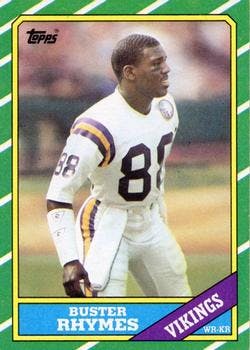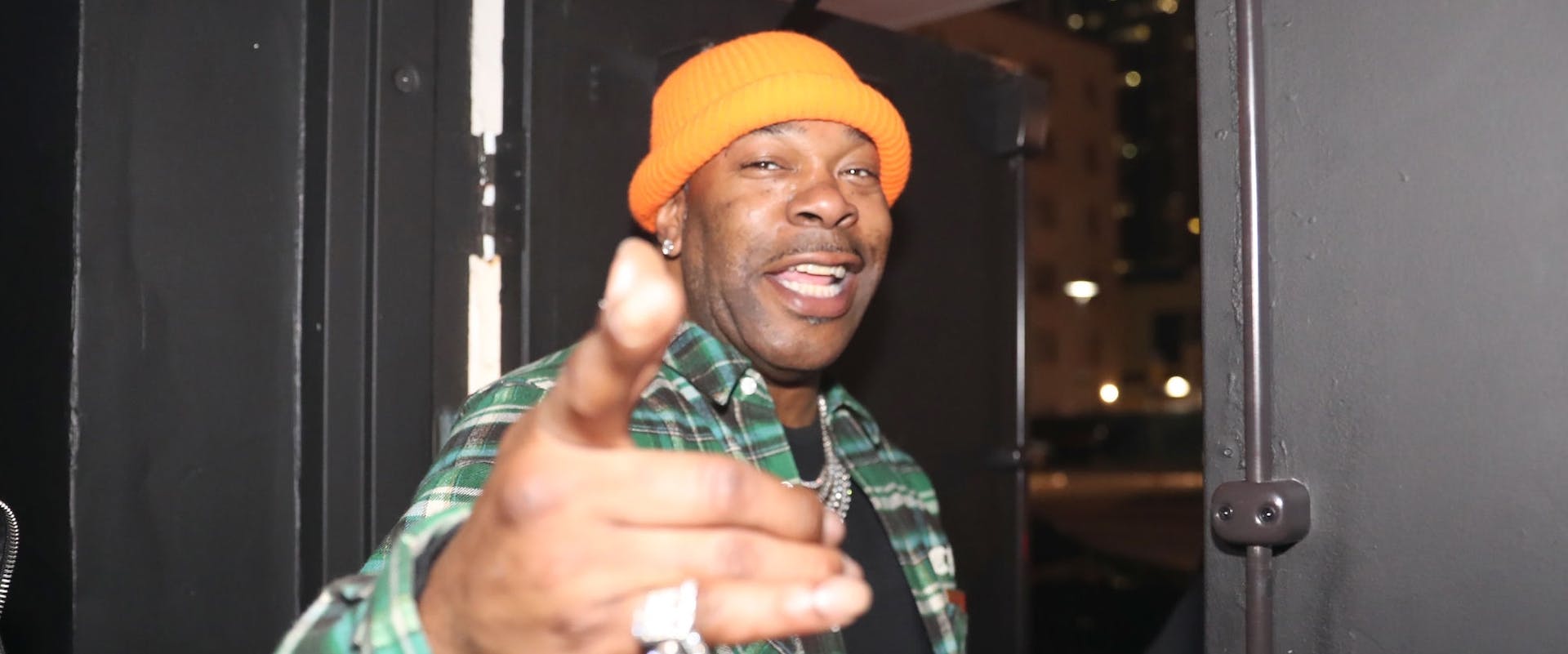
How Busta Rhymes Got His Name
How Busta Rhymes Got His Name
By Alec Banks
Published Wed, July 13, 2022 at 12:35 PM EDT
Busta Rhymes has one of the most unique MC monikers in Hip-Hop. But where does it come from?
There was a time in Hip-Hop when seemingly everyone had a ski-name: T Ski Valley, Kool Rock Ski, Joe Ski Love, Luvbug Starski, and Busy Bee Starski, just to name a few. At one point , even LL COOL J was considering going by the name "J Ski," but according to him, his grandfather forbade it because there was a rumor that "ski" was a subliminal reference to snow/cocaine.
While Hip-Hop pioneers have dismissed this as an urban legend, there's simply no denying that a ski name was part of an MC's playbook.
When Busta Rhymes was beginning his foray into Hip-Hop as a teenager in Brooklyn in the mid '80s, he went by "Chill-O-SKi" — utilizing dancehall influence from artists like Papa San and Lieutenant Stitchie — to begin to define his signature, rapid-paced delivery that would show up in early works with Leaders of the New School and A Tribe Called Quest.
"I thought it was cool because at the time all of my favorites had three-part rap names like LL COOL J or The Fat Boys, right?" Rhymes said. "Prince Markie Dee or Kool Rock Ski or some of the pioneers like Grandmaster Caz or Grandmaster Flash."

During Rhymes' teenage years, most NFL enthusiasts were focused on the exploits of the '85 Chicago Bears who were running through the league schedule with ease thanks to a potent offense piloted by Walter Payton, and a defense that cut through lines like Mannitol.
Their fellow division rivals, the Minnesota Vikings, were middle of the pack at best. However, George "Buster" Rhymes, a rookie that season, was earning a reputation as a one of the most dynamic return men in the game.
DROP YOUR EMAIL
TO STAY IN THE KNOW
The name "Buster" was given to him by his grandmother because of his desire to break out of his crib. In another story, the nickname stemmed from his voracious appetite during meals that made him viable of "busting" at the seams.
As a senior at Northwestern High School in Miami, Rhymes rushed for 1,357 yards on 231 carries, and led the Bulls to their first winning season in a decade. Division 1 schools across the country lined up to offer him a scholarship. For most coaches, he was a can't-miss-prospect: a 6-4 and 215 pound running back who ran a 4.4 40-yard dash, and could bench press close to 400 pounds. Oklahoma coach, Barry Switzer, made the most convincing pitch and lured Rhymes to Norman.
As a freshman, Rhymes broke a 30-year-old freshman rushing record. Despite his noteworthy start, his career stalled. He was limited to just 442 rushing yards his sophomore season, and often found himself on the bench because of what was perceived to be "sub-par" blocking.
In Mach 1982, he and defensive back, Elbert Watts, were suspended from the team for stealing a teammate's radio. In December, he was suspended for cheating on a test, and enrolled at Oscar Rose Junior College where he took 17-hours of credits and was eventually allowed back into Oklahoma.
But the stories didn't stop there. Former Oklahoma linebacker, Brian Bosworth, recalled a snowball fight outside the athletic dormitory that Rhymes ended by firing a machine gun out the window.
"“So right in the middle of the fight, Buster went up to his room, opened his door, and let fly with this Uzi above all their heads," Bosworth wrote in his memoir. "Just a few innocent warning blasts.”
After playing at Oklahoma for five seasons, Rhymes was drafted in the fourth round of the 1985 draft by the Vikings. It was a relatively low-risk, high reward, selection by a Vikings team looking to inject playmaking abilities into a roster that had gone 3-13 the previous year.
By the end of the 1985 season, Rhymes had set the then-NFL record for single-season kick return yards with 1,345. His biggest highlight, a 88-yard return in the season finale against Philadelphia, left him wheezing at the Eagles’ 8-yard line.
"I was running to the right, and a guy hit me straight up. Boom!” he said. “I remember spinning around, running back across the field, down the sideline and by the time I got to the Philly 45 I was so tired I remember thinking as I was running, ‘If I could just make it to the end zone and collapse.’ I ended up about 10 yards short and all I could think of was, ‘How did I get here?’"
But there were off the field issues as well. He was suspended by coach Bud Grant for what was described as a drug-related offense. In late 1985 and again in April 1986, he entered treatment at the Hazelden Foundation in Center City for cocaine dependency.
After catching eight passes for 149 yards in 20 NFL games, Rhymes was released in November 1987. He eventually made his way to the Grey Cup champion Winnipeg Blue Bombers of the Canadian Football League.

While Busta famously attended high school at George Westinghouse Career and Technical with JAY-Z, The Notorious B.I.G., and DMX, he cites his move to Long Island as being transformative. Specifically, he was introduced to Public Enemy, and their go-to production outfit, The Bomb Squad, who had a conceptual theory about how to be successful in Hip-Hop. He soaked it up like a sponge.
"It was called CLAMP: Concept, Lyrics, Attitude, Music and Performance," he said. "Chuck always said, 'When you have all of those areas of your career mastered down to the science of each one of those elements separately, you become even more dangerous when you know how to incorporate that collectively. That's when you got a clamp on your career, that's when you got a clamp on your legacy, that's when you got a clamp on securing the win.' I live by that to this day. That has never failed me. I teach it to everything and everyone that is under my tutelage."
Chuck D was specifically drawn to how animated and energetic the then, "Chill-O-SKi" was. He said his aggressive showmanship was akin to someone effortlessly excelling at football. Despite George "Buster" Rhymes not necessarily being a household name, Chuck offered it up as a suggestion. The man who would eventually adopt the moniker wasn't so sure.
"I hated the name," Busta Rhymes recalls. "Because Chuck D and them were the guys we wanted to be like and looked up to you usually wanted to try it, so I ran around for like three, four months and people fell in love with the name because it just matched — 'Busta Rhymes' — even without knowing about the legendary Buster Rhymes from the Minnesota Vikings. When you see me in this burst of energy, how I'm trying to bust through, it just made sense with just the way I displayed how I did my thing, you know? So it still worked for me even without knowing about the Buster Rhymes history."
George "Buster" Rhymes has battled addiction since his playing career ended. However, he seems to relish how Busta Rhymes adopted the moniker and made it world famous.
“My past is not a glorious thing in some areas,” he said. “I’ve learned and moved on. I’m just not the same person. My life today is pretty low key. I go to work. I’m pretty much a homebody.”
Be sure to cop your tickets to the Rock The Bells Festival to see Busta Rhymes perform.



